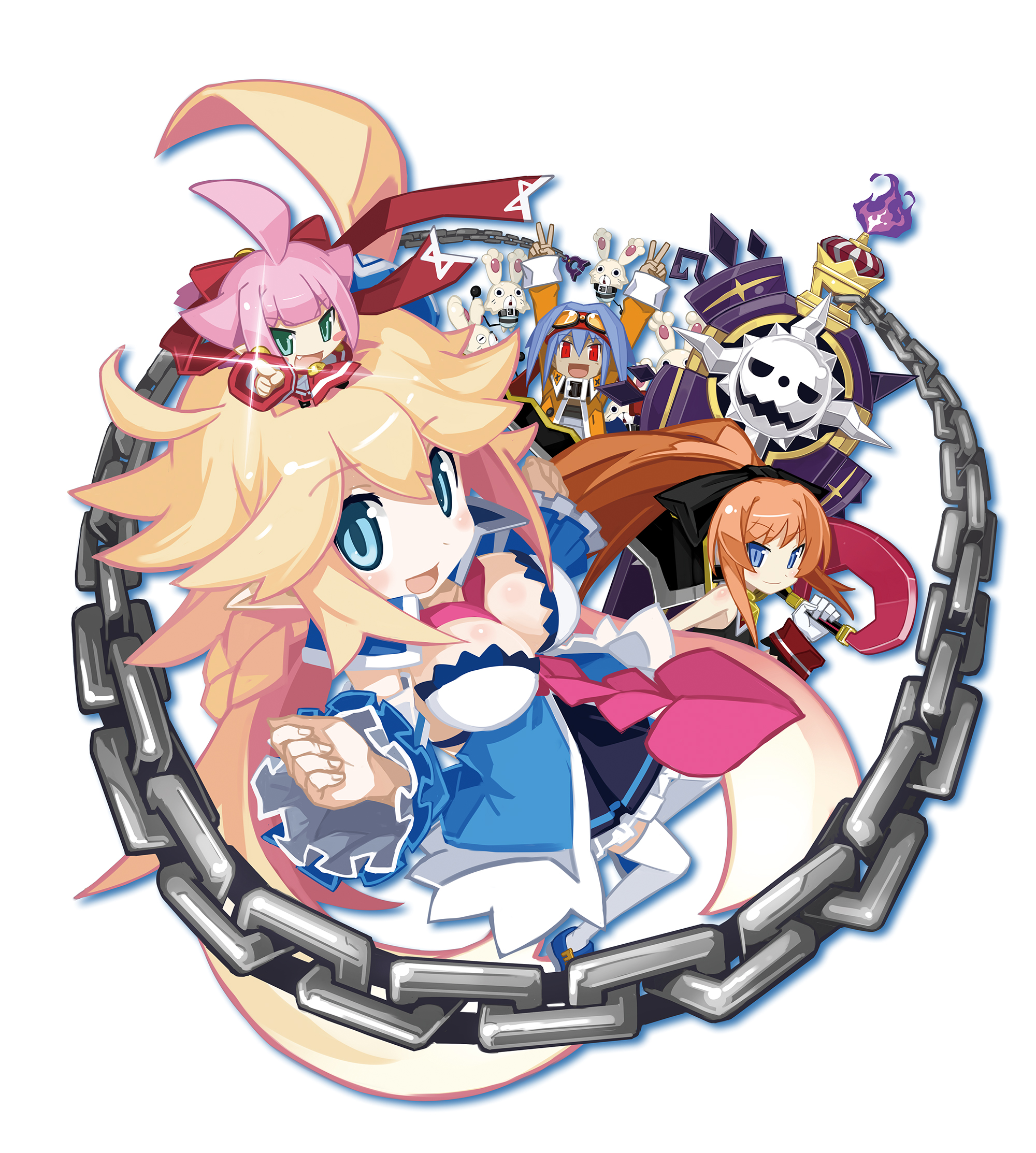12DOVE Verdict
Pros
- +
A return to form for players who enjoyed the first Mugen Souls
- +
Colorful designs and settings
Cons
- -
Uninteresting and clich-ridden plot
- -
Pointless
- -
annoying
- -
and overlong cutscenes
- -
A confused and contradictory battle system
Why you can trust 12DOVE
Mugen Souls Z is an uncomfortable foray into the candy-colored world of Lolita complexes. A follow-up to the 2012 JRPG Mugen Souls, Souls Z picks up right where its predecessor left off in almost every way, right down to troubling fixations. Unfortunately, Souls Z also takes on the first game's failings and adds a few of its own. With few improvements and even fewer original ideas, Souls Z trips right out of the gate, and continues to stumble every step of the way.
One of Souls Z’s biggest pitfalls its nonsensical story and repetitive progression. Mugen Souls’ manic pixie protagonist Chou-Chou is replaced by a new main character, ultimate god Syrma, who goes in search of her other 11 incarnations to recreate her true form. (And save the universe or something, it's all pretty unclear.) The journey takes you to a dozen different worlds, but the narrative pattern doesn’t change much between them: go to world, find person, beat up person, repeat. While your objective in each world is to take it over and capture its patron god, each zone is packed with an overwhelming amount of boring filler content, to the point where your final goal feels more like a side note.
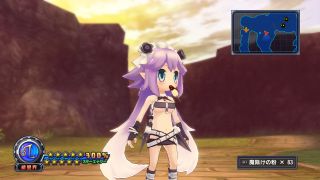
Though Souls Z sports a large cast, the conversations between its many characters rarely contribute much to the story. The fourteen-person crew of the original Mugen Souls returns, but mostly as cameo fodder, and meanwhile-back-at-the-ranch updates on them constantly derail the flow of the game. Things are no better when it's just the main cast in the spotlight, as cinematic sequences are long, frequent, and consist of "quirky" conversations that do nothing for the story as a whole. (Note: when you can fast-forward through an hour of cutscenes and miss nothing, something is wrong.)
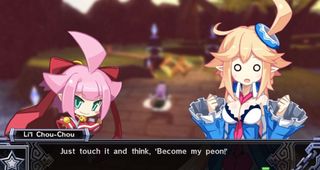
In line with the characters and storyline, the gameplay is likewise dull and convoluted. Up to four characters at a time participate in turn-based, open-area combat, using physical and magical attacks to clear the field of monsters. The concept is simple at its core--kill beasts for pleasure and profit--and it’s easy to fall into a pattern of mashing the attack button to get the fight over with.
Other features pop up to add flavor, but they often clash with what’s already there, making them difficult to fully utilize. For instance, Syrma has the unique ability to change personalities and "captivate" enemies, which clears the field of enemies by subjugating them to her will. However, it doesn't mesh well with the rest of the battle system: You don't want to captivate an enemy you're going to kill and vice versa, so a portion of your party is often left idle. Souls Z tries to make up for that with additional features--bouncing your enemies around the field to change their status boosts, for instance--but the barrage of options makes things unnecessarily confusing.
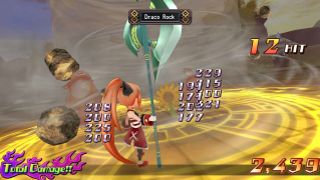
Even when a feature is actually compelling, it tends to buckle under the weight of everything around it. For example, crystal orbs are scattered around the field that cause certain status effects when characters stand near them. These can turn the tide of battle if used correctly, but you often don’t have time to think about them because too many things are going on.
There’s other stuff to do when battling gets dull, such as ship fights and subjugating planets, but with mechanics even simpler than the game’s basic combat (all it takes to turn a planet into a peon is to click through a few dialogue boxes, for instance) they have a pretty short shelf life. Dedicated fans might enjoy the setup, but these distractions are far too shallow to hold interest for long--certainly not long enough to reach Souls Z's 9,999 level cap (!!!).
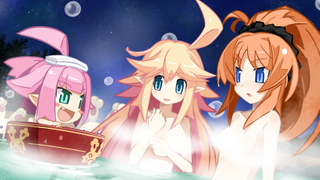
It's disappointing, as Souls Z has some promising elements at its core. The search for the ultimate gods is initially intriguing, and makes you wonder what will happen when they're all together again. The aforementioned power-up crystals are really cool tools, and using your enemies' romantic preferences against them is at least different. Unfortunately, the rush to cram in superfluous features covers up Souls Z's best parts, and with the remainder of its attention on strategically placed boob-clouds, fun gameplay falls by the wayside.
The result of all this is a game that is both confused and confusing, unsure what it wants to be and so convoluted that only the most dedicated Mugen Souls fan is likely to enjoy it. If you happily suffered the slings and arrows of the original, by all means, Souls Z is probably right for you. Everyone else should tread with caution, and remember this: When the highlight of a game is how colorful it is, that’s usually a bad sign.
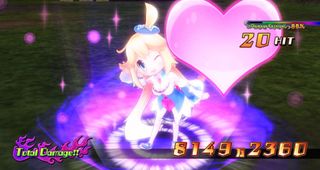
With a dull storyline, annoying characters, and clumsy battle system, Mugen Souls Z duplicates the failures of its predecessor and adds some of its own.
More info
| Genre | Role Playing |
| Description | Conquer the seven worlds in this latest Mugen installment |
| Platform | "PS3" |
| US censor rating | "Teen" |
| UK censor rating | "" |
| Release date | 1 January 1970 (US), 1 January 1970 (UK) |
Former Associate Editor at GamesRadar, Ashley is now Lead Writer at Respawn working on Apex Legends. She's a lover of FPS titles, horror games, and stealth games. If you can see her, you're already dead.
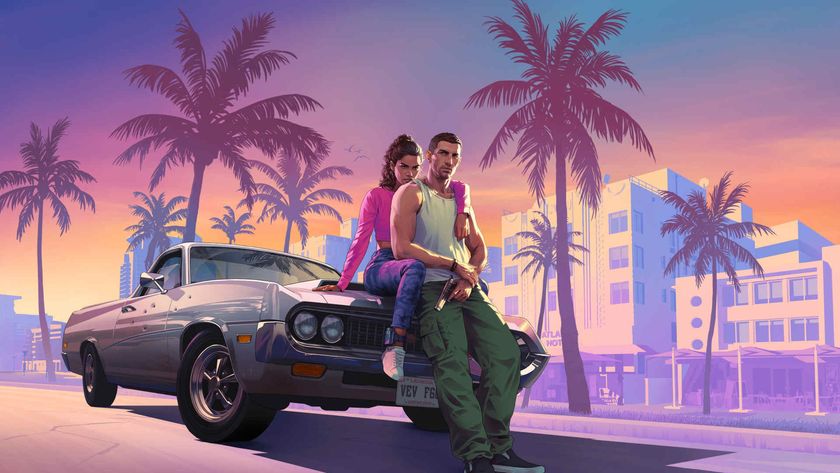
Ahead of GTA 6, Take-Two CEO says he’s “not worried about AI creating hits” because it’s built on recycled data: “Big hits […] need to be created out of thin air”

Getting Over It creator Bennett Foddy threatens the world once again: If you want Baby Steps to be a brutal rage game, "you can inflict that on yourself"

A Simpsons Hit and Run Remake will probably never happen – and I don't want it to
